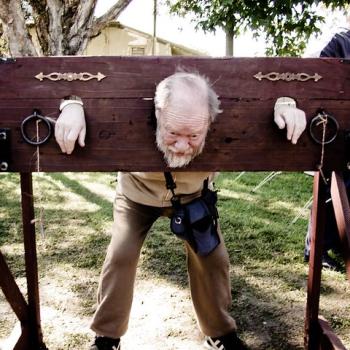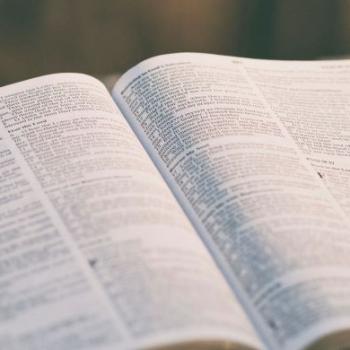Editor's Note: This article is part of an online symposium, "Does Seminary Have a Future?" hosted at Patheos this month. Read other perspectives here.
"It sounds, ah, kind of funny to say it," the new pastor said to me, "but I'd like to learn the, ah, skill of compassion. I didn't learn that in seminary."
The young pastor was not talking about learning to care for the suffering or the sick. He did learn something about that in seminary, or at least in CPE.
He's looking for something else:
"I need to learn how to hold those conversations where people are so opposed to the changes you want to make; I need to hang in those conversations with love and care for the ones who are attacking me. Somehow I need to figure out how to hold that space, so that there's room for the tough conversations. I want to be in a church where folks are willing to keep coming back, keep engaging one another even when we differ—not just shutting down or staying away."
This pastor identifies himself as a Progressive Christian. Like many recent seminary graduates, he came to faith in a more evangelical setting, and discovered in seminary that there is a world of scripture scholarship and theological questioning beyond his early literalism. He's learned to embrace ambiguity and to honor the questions without jumping to sure resolutions. He's also learned that "the other" is a beloved child of God, and he sees that Christianity is about sharing that love rather than condemning the one who is different. His new embrace of Progressive Christianity has riled up his old friends, and they mince no words in castigating his heretical stray from the old fold.
I am listening to this new Progressive Christian because I want him to find the tools he needs to lead the church into a new day. His conservative seminary taught him a narrow version of True Religion, and I must say that many seminaries, all across the Christian landscape, teach something similar, either through direct instruction or amorphous cultural absorption. I know that I graduated from my own proudly liberal Northeastern seminary nearly three decades ago convinced of the Rightness of my Leftness. And I didn't learn a thing about holding the kind of space, the open conversation, that this young pastor names.
He is naming what we all need right now. We need to hang in with the tough questions, without jumping to quick resolution. We need to learn how to speak—and mostly how to listen—without demonizing each other. We need to recognize our differences and honor them, not gloss over them. Those of us in the church need to head directly into the hard conversations, without just "making nice" and excusing our unwillingness to engage controversy as "being pastoral." We need to recognize that we all have both better and lesser angels. We need to learn how to stand, as Parker Palmer names it, the "tragic gap."
In his new book Healing the Heart of Democracy: The Courage to Create a Politics Worthy of the Human Spirit, Parker Palmer writes of heartbreak:
Like most Americans, I love democracy, and like many I know, it breaks my heart when democracy is threatened, from within or without. What else should I feel when 'We the People' find our will trumped by corporate money, official, corruption, and Orwellian lies? Or when we undermine ourselves by indulging in cheap animosities toward those who disagree with us instead of engaging our differences like grown-ups? (p. 57)
And he names the healing power of developing "supple hearts" in response to life's blows:
If we are able to enter into and consciously engage hard experiences . . . our hearts will get the kind of exercise that can make them supple. But if we try to shield ourselves against life's teachable moments, our hearts—like any unexercised muscle—become more vulnerable to stress. Under stress, an unexercised heart will explode in frustration or fury . . . But a heart that has been consistently exercised through conscious engagement with suffering is more likely to break open instead of apart. Such a heart has learned how to flex to hold tension in a way that expands its capacity for both suffering and joy. (p. 60)
Tomorrow's faith leaders need supple hearts, that "skill of compassion" the young pastor names; they need the courage to allow their hearts to break open, not apart, so that they can "flex to hold tension."
So, are seminaries teaching this? I've not seen much evidence of it. But I do see ample evidence of heartbreak. So it's time for some exercise to keep the heart supple, whether that happens in seminaries or churches or even in online conversations. We need those supple hearts for the living of these days.
10/17/2011 4:00:00 AM




